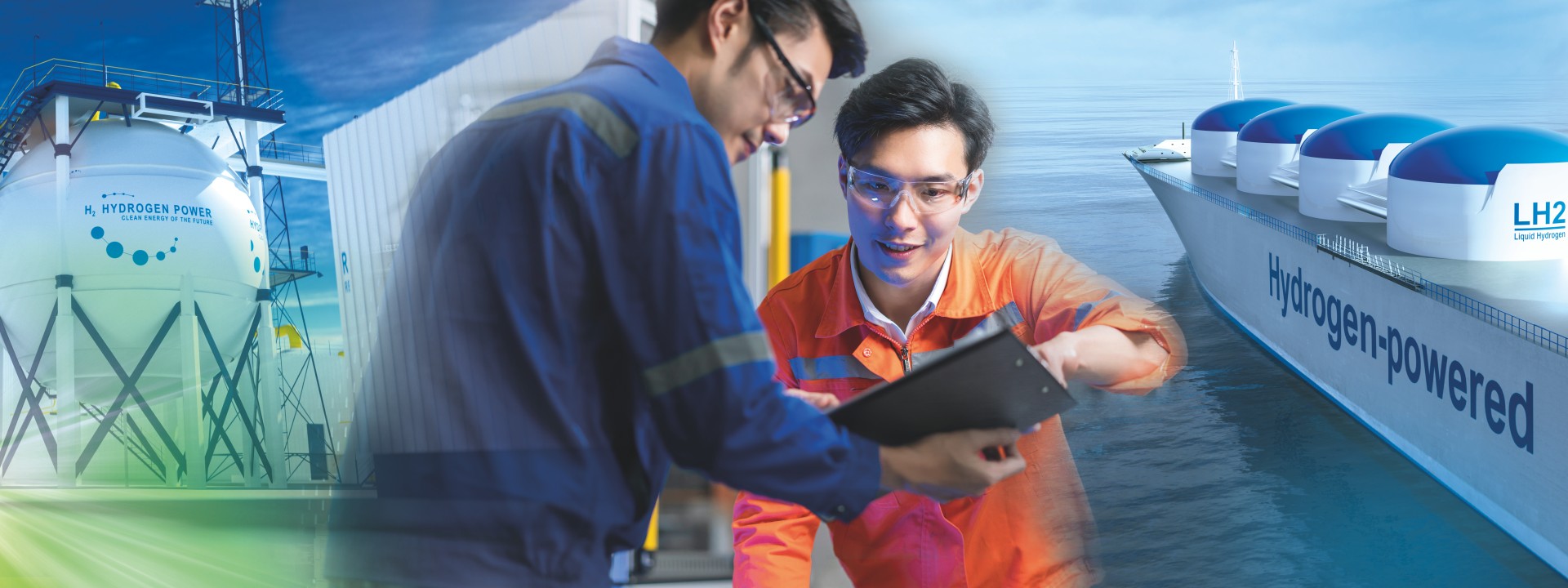Hydrogen can be stored in a gaseous or liquid state as well as in chemically bound form over long periods of time. The selection of hydrogen pressure vessels and other storage methods depends on the mobile or stationary requirements, the stability of the materials used, the amount of hydrogen to be stored and on safety aspects.
Hydrogen storage: what are the properties?
Under ambient conditions, hydrogen is gaseous. It is the lightest element in the periodic table and has a very low volumetric energy density. Thus, for all of the advantages of conventional and alternative hydrogen storage methods, there are also many challenges. The type of optimal hydrogen storage always depends on the specific use.
Conventional hydrogen storage.
To store gaseous hydrogen in a limited volume, it must be highly compressed. Hydrogen gas is very difficult to contain; it can escape through the tiniest leaks. At greatly reduced pressure, it can be stored in its liquefied form, however only at a temperature of -253 °C, which requires consistent cooling.
CGH2 – Storage as compressed gas
Gaseous hydrogen (CGH2: Compressed Gaseous Hydrogen) is compressed and stored in hydrogen pressure vessels that must be able to withstand very high pressure. This storage method is ideal for stationary storage, e. g. in mobile applications for cars and commercial vehicles. Compressed gas storage at 700 bar is the most advanced solution to date.
LH2 – Storage as liquid hydrogen
Hydrogen can also be stored in its liquid state at a much higher density and at -253 °C (LH2: liquid hydrogen). Since this storage method is cheaper for larger gas quantities, it is used for off-grid transport over long distances, e. g. transport by tank trucks, tank barges or railway tank cars. A disadvantage is that liquid hydrogen can evaporate through warming (the so-called boil-off) and therefore needs consistent cooling.
Alternative forms of hydrogen storage.
To use an alternative way to address the challenges of maintaining pressure or temperature, so-called hydrogen carriers are used. As alternative hydrogen storage forms, they use technologies based on the physical or chemical bonding of hydrogen to another substance.
Storage by absorption in metal hydrides
Hydrogen can form a chemical compound with a metal or an alloy, a so-called metal hydride, which allows solid-state storage: When the hydrogen comes into contact with the surface of the storage material, the hydrogen molecules break down into atomic hydrogen and penetrate the material. However, this has the disadvantage that the weight of the storage material is relatively high compared to the absorbed hydrogen.
LOHC - Liquid organic hydrogen carrier
Liquid Organic Hydrogen Carriers (LOHC) store hydrogen in a liquid-organic carrier medium. During this process, the hydrogen is converted into another substance by chemical bonding, which allows a pressure-less storage and the transport of large quantities even at room temperature. By reversing the chemical reaction, the hydrogen is released from the carrier.
Examples of LOHC systems include hydrogenation of organic substances, the formation of alcohols with carbon monoxide, the coupling with oils, or even the use of ammonia as a carrier substance for hydrogen.
Solving the challenges of hydrogen storage.
Each way of storing hydrogen has its place. Whether gaseous, liquid, stationary, mobile or in a solid carrier medium – the specific application dictates the storage technology to be used, whereby the following challenges must be addressed:
- The overall efficiency of the energy conversion chain "electrical energy to hydrogen to electrical energy" must be taken into account.
- High flammability or a wide flammability range must be taken into account.
- The storage of large quantities is challenging due to the large storage volume needed, especially in vehicles.
- Hydrogen can easily escape through leakage.
- Constant cooling is necessary when storing liquid hydrogen.
Our range of services includes:
As an operator of gas grids, gas storage facilities or intermediate storage facilities or as a gas distributor, we support you with all challenges related to the storage of hydrogen. We will assist you with the cost-effective retrofitting of your existing facilities as well as with the planning and construction of new facilities.
- Suitability testing of existing storage facilities for their compatibility with hydrogen
- Support with concept development for new business models, profitability studies, selection of suitable technologies and suitable locations as well as personnel qualification
- Supervision of the construction (construction and installation) of hydrogen storage facilities
- Acceptance testing
- Approval of power-to-gas plants
- Conformity assessments for hydrogen storage facilities
- Proof of performance at the installation site for efficiency guarantees and utilization rate guarantees
- Risk analyses according to HAZOP/ROGA, and preparation of safety concepts, incident response plans, emergency response plans and hazard prevention plans for storage quantities of 5 tons or more
Downloads
| Bringing Clean Hydrogen to Life, Safely – a sustainable pathway for the energy transition | 383 KB | Download |
Our safety services for hydrogen pressure vessels and more.
As a major testing service provider, we offer a wide range of testing and inspection services that we tailor to your individual needs. For the effective storage of hydrogen, we also support you with the following services:


